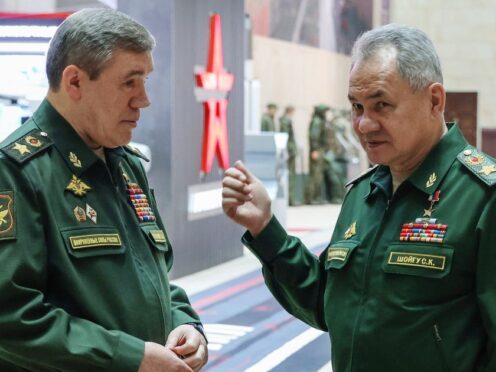The International Criminal Court said on Tuesday that it has issued arrest warrants for Russia’s former defence minister and its military chief of staff for attacks on civilian targets in Ukraine, the third time the global court has issued warrants for senior Russian leaders.
Former defence minister Sergei Shoigu and Chief of Staff General Valery Gerasimov are accused of war crimes and the crime against humanity of inhumane acts.
Judges who approved the prosecutors’ request for arrest warrants said the suspects are charged with inhumane acts because there is evidence they “intentionally caused great suffering or serious injury to body or to mental or physical health” of civilians in Ukraine.
The court said in a statement that warrants were issued on Monday because judges consider there are reasonable grounds to believe the men are responsible for “missile strikes carried out by the Russian armed forces against the Ukrainian electric infrastructure” from October 10 2022, until at least March 9 2023.
“During this timeframe, a large number of strikes against numerous electric power plants and substations were carried out by the Russian armed forces in multiple locations in Ukraine,” the court added.
Under the leadership of Mr Shoigu and Gen Gerasimov, the Russian military has launched waves of missile and drone strikes on Ukraine that have killed thousands and damaged the country’s energy system and other vital infrastructure.
Moscow has insisted it only has targeted military facilities despite daily casualties in civilian areas.
Situation in #Ukraine: #ICC judges issue arrest warrants against Sergei Kuzhugetovich Shoigu and Valery Vasilyevich Gerasimov. Learn more ⤵️ https://t.co/fEbWyOnTsC
— Int'l Criminal Court (@IntlCrimCourt) June 25, 2024
The court said missile attacks covered in the warrant allegedly targeted civilian objects. They added that in the case of any installations that could have been considered military targets “the expected incidental civilian harm and damage would have been clearly excessive to the anticipated military advantage”.
Details of the warrants were kept under seal to protect witnesses, the court said.
There is no immediate likelihood of either suspect being detained. Russia is not a member of the global court, does not recognise its jurisdiction and refuses to hand over suspects.
Last year, the court also issued a warrant for Russian President Vladimir Putin, accusing him of personal responsibility for the abductions of children from Ukraine.
In March this year, the court also issued arrest warrants for two high-ranking Russian military officers on charges linked to attacks on civilian infrastructure in Ukraine that judges said happened “pursuant to a state policy”.
Mr Putin replaced Mr Shoigu as defence minister in a Cabinet shake-up in May as he began his fifth term as president.
Mr Shoigu, 69, has widely been seen as a key figure in Mr Putin’s decision to invade Ukraine on February 24 2022. Russia had expected the operation to quickly overwhelm Ukraine’s much smaller and less-equipped army and for Ukrainians to broadly welcome Russian troops.
Instead, the conflict galvanised Ukraine to mount an intense defence, dealing the Russian army humiliating blows, including the retreat from an attempt to take the capital, Kyiv, and a counter-offensive that drove Moscow’s forces out of the Kharkiv region and near Kherson in the south in the autumn of 2022.
Mr Shoigu, who had personal ties with Mr Putin, got a soft landing with the high-profile post of secretary of Russia’s Security Council.
At the same time, his entourage faced purges. A long-time associate and deputy, Timur Ivanov, and several other senior military officers were arrested on corruption charges, and other senior Defence Ministry officials lost their jobs.
Gen Gerasimov, Chief of the General Staff since 2012, has so far kept his job. The 68-year-old career military officer has directly overseen Russian military operations in Ukraine.
